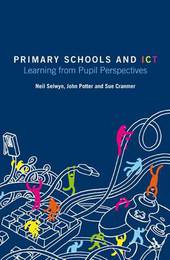
|
Primary Schools and ICT: Learning from pupil perspectives
Hardback
Main Details
| Title |
Primary Schools and ICT: Learning from pupil perspectives
|
| Authors and Contributors |
By (author) Neil Selwyn
|
|
By (author) Dr Sue Cranmer
|
|
By (author) Dr John Potter
|
| Physical Properties |
| Format:Hardback | | Pages:208 | | Dimensions(mm): Height 234,Width 156 |
|
| ISBN/Barcode |
9781855397514
|
| Classifications | Dewey:372.1334 |
|---|
| Audience | | Professional & Vocational | |
|---|
| Illustrations |
27
|
|
Publishing Details |
| Publisher |
Bloomsbury Publishing PLC
|
| Imprint |
Network Continuum Education
|
| Publication Date |
4 March 2010 |
| Publication Country |
United Kingdom
|
Description
The use of information and communication technologies (ICTs) in primary schools is often problematic and frustrating for teachers and pupils alike. Drawing on a study of the experiences and perceptions of over 600 primary pupils, this book explores how ICT provision may be improved from a 'bottom-up' perspective - considering a number of radical suggestions for recasting primary schools as sites of innovative, imaginative and empowering technology use. There have been relatively few empirical studies of primary school IT use, and very few studies of pupils' perceptions of using technologies in primary schools. This book addresses the lack of 'learner voice' in the existing literature by providing interesting, thought-provoking insights into children's views of ICT. From this background, the book is able to make a number of practical suggestions for changes to the nature of ICT organisation and provision in schools, and so will benefit schools' efforts to better align education ICT use with the needs of children.
Author Biography
Neil Selwyn is a Distinguished Research Professor at the Faculty of Education, Monash University, Australia. Sue Cranmer is Lecturer in Digital Education and Social Justice, Lancaster University, UK. John Potter is Programme leader for the MA In Media, Culture and Communication at the London Knowledge Lab, Institute of Education, University of London. He previously worked in primary and teacher education in ICT and Literacy at Goldsmiths College and at the University of East London. Before working in higher education, he was an ICT advisor in the London Borough of Newham and a Primary teacher with management responsibility for ICT, Literacy and Assessment in Tower Hamlets. John is currently involved in a number of education ICT organisations and associations, including ITTE and Mirandanet. His research interests are in the fields of learning, digital technology and new media cultures.
Reviews"This book looks at primary ICT from a very different perspective by placing pupils at the heart of thinking on ICT, rather than being led by the technology...It uses the views of over 600 pupils to draw out what it is about ICT that excites, motivates and interest children in and outside the classroom. Here is a book that uses research to really look at the Every Child Matters agenda and take notice of the pupil voice." Graham Jarvis, Associate Principal Lecturer in Education, Leeds Trinity University College, UK 'A readable and convincing assessment of where ICT currently sits in primary education linked to some thoughtful proposals for change which, significantly, involve allowing pupils a greater say in primary ICT.' Trevor Millum, consultant on writing and ICT for NATE, UK 'At last - an honest picture of ICT in primary schools, with findings developed from a vast amount of practical, pupil-centred research.' -- The Teacher 'In this book, Neil Selwyn, John Potter and Sue Cranmer have been able to share the differing perspectives of over 600 primary pupils in considering the place of ICT in their lives. The detail provided on the children's current uses of technology, combined with a realistic sense of what could be possible, ensures the book meets one of its key aims - to reinvigorate the debate and reimagine ICT in school. In the current educational climate where the curriculum for both primary and secondary schools is under review in the UK, it seems vital to take into account the perspectives of the learners who are most affected by any change. By listening to and recording the experience of children from a range of backgrounds, this book provides a major contribution in developing that understanding.' Lynn Roberts, Institute of Education, University of London, UK -- London Review of Education
|